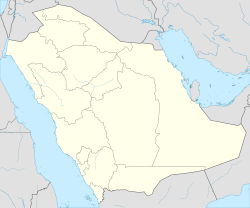Al Muwayh | |
|---|---|
Village | |
| Coordinates: 22°44′45″N41°35′33″E / 22.74583°N 41.59250°E | |
| Country | |
| Province | Makkah Province |
| Time zone | UTC+3 (EAT) |
| • Summer (DST) | UTC+3 (EAT) |
Al Muwayh is a village in Makkah Province and the capital of the muwayh Governorate, in western Saudi Arabia. [1]
